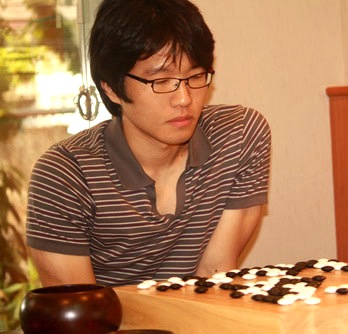2013 Amateur Meijin: Three for Hong
 This year Japan’s Amateur Meijin title match had a new twist: the challenger, Wu Poyi, was a native of Taiwan. He learned to play go there in kindergarten. Inspired by the feats of Taiwan-born Chang Hsu (Cho U), Wu dreamed of becoming a pro in Japan, but he remained in Taiwan until 2009, when Miaoli County, where he had entered junior high school, granted him financial assistance to study as an insei in Tokyo. Over the next four years he worked his way up from class F to the top of class A in the insei rankings, but was never able to take one of the top two places in the Tokyo round robin that annually qualifies two new pro shodans. In March 2013, being 17 years old, he had to retire as an insei, but he has not abandoned his dream. He now lives and studies at Hong Mal-geun-saem’s dojo in Tokyo, and will attempt to win his way into the round robin as a non-insei, the age limit for doing which is 22.
This year Japan’s Amateur Meijin title match had a new twist: the challenger, Wu Poyi, was a native of Taiwan. He learned to play go there in kindergarten. Inspired by the feats of Taiwan-born Chang Hsu (Cho U), Wu dreamed of becoming a pro in Japan, but he remained in Taiwan until 2009, when Miaoli County, where he had entered junior high school, granted him financial assistance to study as an insei in Tokyo. Over the next four years he worked his way up from class F to the top of class A in the insei rankings, but was never able to take one of the top two places in the Tokyo round robin that annually qualifies two new pro shodans. In March 2013, being 17 years old, he had to retire as an insei, but he has not abandoned his dream. He now lives and studies at Hong Mal-geun-saem’s dojo in Tokyo, and will attempt to win his way into the round robin as a non-insei, the age limit for doing which is 22.
Since Japanese insei do not compete for Japanese amateur titles, the Amateur Meijin was Wu’s first major amateur tournament in Japan. To become challenger, he had to start by earning one of the two places reserved for Tokyo residents. His start was promising: he won the Tokyo Amateur Meijin preliminary in April. Then he had to win a six-round challenger knockout held July 14-15. His six straight victories in the knockout began with a resignation win over a 14-year old opponent from Nagasaki prefecture, and ended with a 3.5-point ko-powered win over an opponent his own age from Tomiyama prefecture. In between, he defeated the oldest player in the knockout, Nishimura Osamu, winner of the Asahi Amateur Best Ten tournament (the forerunner of the Amateur Meijin) in 1972.
And then Wu faced his toughest opponent, the defending Korean-born Amateur Meijin Hong Suk-eui (Japanese reading: Hon Soggi). While Wu had been working his way toward the challenger’s spot, Hong had been competing with remarkable success in the Agon Kiriyama Cup, defeating seven pro opponents, culminating in a victory over a 9-dan that put him into the best-16 stage (where he finally lost). In 2009, while still living in Korea, Hong had accomplished a similar feat in the BC Card Cup. He had also won about half a dozen Korean amateur titles. ‘If I lose to him, it will be only natural,’ Wu said.
The best-of-three Amateur Meijin title match was held at the Sekitei inn in Yugawara. Since Hong now lives in Osaka and Wu in Tokyo, the match was an east-west confrontation, something that Japan revels in. Drawing white in the first game on July 27, Wu played aggressively in the opening and middle game, but Hong found a successful counterattack that forced Wu to resign. In the second game on July 28, Hong took an early lead but relaxed in the middle game and then had to fight hard to recover. In the end he out-read Wu and won again by resignation. Hong is the first player to win the Amateur Meijin title three times, and he hopes to make it four next year.
